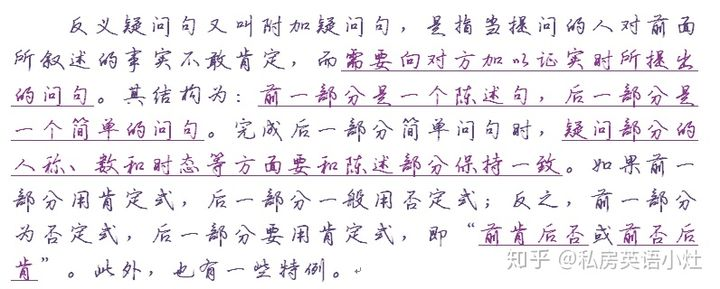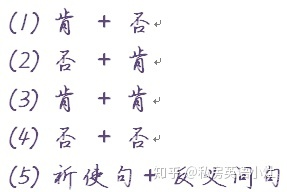27.反义疑问句
反义疑问句是神马?

一、反义疑问句的五种形式

二、常见特殊形式的反义疑问句及高频考点
(1) 陈述部分的主语为 somebody, nobody, anybody, everybody时,反义问句主语用they,有时用he
- Everybody enjoyed the party, didn't they?
(2) 陈述部分主语为 something, anything, everything, nothing等表物的不定代词时,反义疑问句的主语用it
- Something is wrong with the machine, isn't it?
(3) 陈述部分为 there be 结构时,反义问句也用be (not) there. 除 there be 以外,此句型中的be可用live, appear, come, exist, happen, stand, lie, seem, remain, flow 等词代替,这时反义疑问部分用 doesn't / didn't there
- There seems to be something wrong with the machine, doesn't there?
(4) 陈述部分带有否定或半否定词时,反义疑问句用肯定式
这些词有no, seldom, hardly, never, rarely, few, little, nothing, nobody, etc.
- Few people know him, do they?
- He can hardly see the words on the blackboard, can he?
(5) 陈述部分有加前缀或后缀(un…, im…, dis…etc,)构成的表否定意义的词时,反义疑问句仍用否定式
- He dislikes swimming, doesn't he?
- It's useless to talk with him, isn't it?
(6) 陈述部分有 need和dare时,依情况而定(即need和dare既可作情态动词,也可作行为动词,在疑问部分加以区别)
- He daren't do it, dare he?
- He doesn't dare to ask the teacher, does he?
- He needs help, doesn't he?
(7) 陈述部分用 I am…时,疑问部分用aren't I
- I'm late, aren't I?
(8) 陈述部分是含有宾语从句的复合句时,疑问部分应与主句中的谓语及主语一致
- He said she would come, didn't he?
(9) 陈述部分含有表示所有关系的have时, 疑问部分既可用have, 又可用do, 若陈述部分是have的否定式,疑问部分取决于陈述部分用do或have
- You have a dictionary, haven't you? / don't you?
- He hasn't a lot of time to spare, has he?
- He doesn't have a lot of time to spare, does he?
当陈述部分have不表示“所有”,而表示其它含义时,反义疑问句用do的某种形式
- You often have headaches, don't you?
- She had to take the early bus, didn't she?
(10) 陈述部分有情态动词ought to时,附加部分用ought to 或should都可以
- We ought to go there, oughtn't we? (英)
- We ought to go there, shouldn't we? (美)



